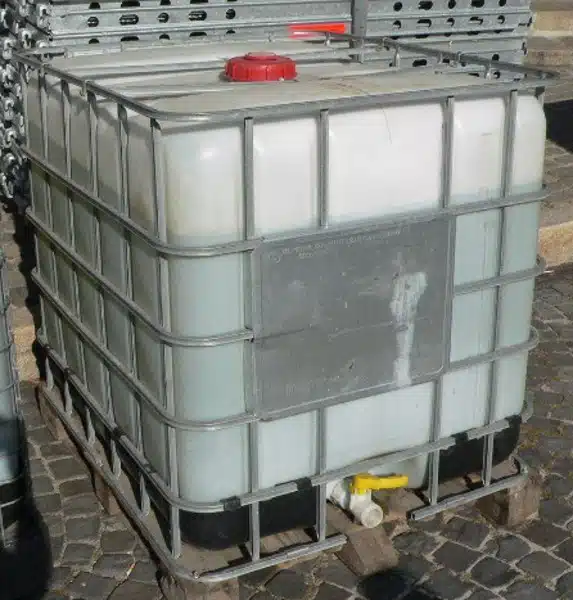What are IBC containers?
Intermediate Bulk Containers (IBCs) are standardized containers used for the storage and transport of liquid, pasty or powdery materials. They are usually made of plastic or steel and have a capacity of 500 to 1000 liters. The transportation and handling of liquid goods is particularly straightforward with this type of container. IBCs are characterized by relatively low acquisition costs and are also optionally available with UN approval for the transport of hazardous goods.
Most IBCs consist of a cubic or rectangular container surrounded by a metal or plastic frame. The container usually has an opening at the top through which the material can be filled and an outlet tap or pump at the bottom through which the material can be removed.
Advantages of IBCs
IBCs are widely used in the industry and offer numerous advantages. These include:
- Efficiency: IBCs can carry large quantities of material per transport, which leads to a reduced need for transportation and thus to cost savings.
- Safety: IBCs are usually made of robust materials and offer a high level of protection for the material during transportation and storage.
- Handling: Due to their standardized size and shape, IBCs are easy to handle and can be loaded, unloaded and stored quickly.
- Sustainability: IBCs are generally reusable and can be cleaned and reused after emptying, resulting in a lower environmental impact and less waste.
Due to their numerous advantages, IBCs are widely used in many industries, including the chemical, food, pharmaceutical and agricultural industries.
What types of IBCs are there?
Different types of IBCs are available depending on the intended use:
- Combination IBC: This type of container consists of a pallet with a plastic tank and a simple lattice cage or tubular frame. In terms of dangerous goods legislation, they are classified as large packaging.
- Plastic IBC: This variant is not used very often in bottling. The container here consists of a free-standing plastic tank and weighs significantly more than a combination IBC due to the thicker wall thickness.
- Metal IBCs: These containers are used in the chemical, pharmaceutical, cosmetics and food industries as they are very robust. They are usually made of stainless steel and can be easily recycled.
- Heatable IBCs: These electrically heatable containers, which are based on metal IBCs, are used to transport temperature-sensitive goods. Goods can be transported at temperatures of up to 180° C.
Collapsible IBCs: Collapsible IBCs were developed to meet the high hygiene and safety requirements of the food industry. They enable the cost-efficient transportation and storage of fruit concentrates, fruit preparations, dairy products and other liquid and viscous products.
Online source:
https://de.wikipedia.org/wiki/Intermediate_Bulk_Cotainer, retrieved: September 24, 2019, 21:00 UTC
Literature source:
Georg Küffner: Far too good to throw away. IBC containers lead a colorful second life. In: Frankfurter Allgemeine Zeitung. No. 286, Frankfurt, December 9, 2014


















